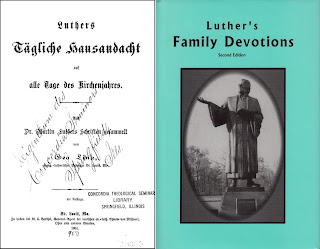The American company
Hobby Lobby is notable for full page nationwide newspaper advertisements on certain holidays of the year that generally promote Christianity. Recently on the American holiday of Independence Day, or the 4th of July, they published a piece entitled "One Nation Under God" and quoted various American statemen on this subject, including several Supreme Court Justices. While Hobby Lobby claims Christianity, its leaders, who have become quite wealthy, are followers of Reformed sect churches. — While surveying old issues of
Der Lutheraner, I ran across a short book review of the autobiography of
Benjamin Franklin, a statesman of worldwide renown. Franklin was not one of those quoted in Hobby Lobby's advertisement. From
vol. 34 (April 1, 1878), p. 53:= = = = = = = = = = = = = = = = = = = =
Benjamin Franklin's Life.

A biography of this not insignificant man in the history of our country, written by himself, has been published by Mr. Jg. Köhler in Philadelphia [WorldCat, this is a German translation “The autobiography to 1759.”]. He also sent a copy to the editor. Since Der Lutheraner is a purely religious publication, we can only speak about this book as far as it touches on religion. If we allow the book its value in other respects, if we allow that one can get to know this man and his time from it, then we cannot avoid declaring that, as far as religion is concerned, it can easily mislead those who have untrained senses. Franklin may have been an eminent practical head, a Christian he was not. He writes, for example: “I had been conscientiously and devoutly educated as a Presbyterian, and although some dogmas of that sect . . . seemed to me incomprehensible and others doubtful, and I often stayed away from the public meetings of the sect because Sunday was the day of my studies, yet I was never without some religious principles.” (p. 122.) But these principles can be subscribed to by every heathen, Jew, and Turk. He continues, “I never doubted, for example, the existence of God, never doubted that he created the world and guides it by his providence; that the most fitting service of God is to do good to men; that our souls are immortal, and that every crime has its punishment and virtue its reward, either here or hereafter.” (p. 122. 123.) He knew the Lord Jesus as Savior. He wanted to be his own Savior. He writes: “About this time I made the bold and serious resolution to strive for moral perfection. I wished to be able to live without making any mistake at any time. I wished to overcome everything that either natural inclination, habit, or society could lead me to do.” (p. 125.) In regard to humility, he had laid down the following rule: “Imitate Jesus and Socrates.” (p. 128.) Is this not appalling, that he places our Lord Jesus next to a blind pagan as a model of humility? Such harmful things occur many times. One must not be blinded by the talk of virtue. Our judgment may seem harsh to some people. But we cannot do otherwise according to God's Word. We cannot do anything against the truth. We cannot do it like the sect papers, which recommend all kinds of things, but nothing truly biblical. It is therefore highly unconscionable, indeed a disgrace, when the editor of the anabaptist “Sendbote” in the number of Jan. 2 thus judges the book: “A better guide to diligence, to perseverance in good, to thrift and honesty, yes, to all virtues which should adorn a citizen, and which are now often missed in our republic, cannot be given to the hands of the youth.” G. [Martin Günther]
= = = = = = = = = = = = = = = = = = = =
Since I had previously read from Franklin's autobiography, I was not surprised by Guenther's review. However I was surprised that the publisher of Franklin's autobiography (German translation) would send a copy of it to the editor of Der Lutheraner. Lutherans and Lutheranism are not a topic of general interest in the world and are generally ignored. You will not see true Lutheran leaders given voice on major issues of the day. You will not see any true Lutherans portrayed in any Hollywood movies. You will see so-called "Protestant" sect preachers generally portrayed in an unfavorable light. So in 1878 Der Lutheraner was recognized as a leading publication for German language people in America. And we see in this review why true Lutheranism is shunned by the world, for it stands up against unbelief wherever it is portrayed, including in one of the fathers of the American nation.












